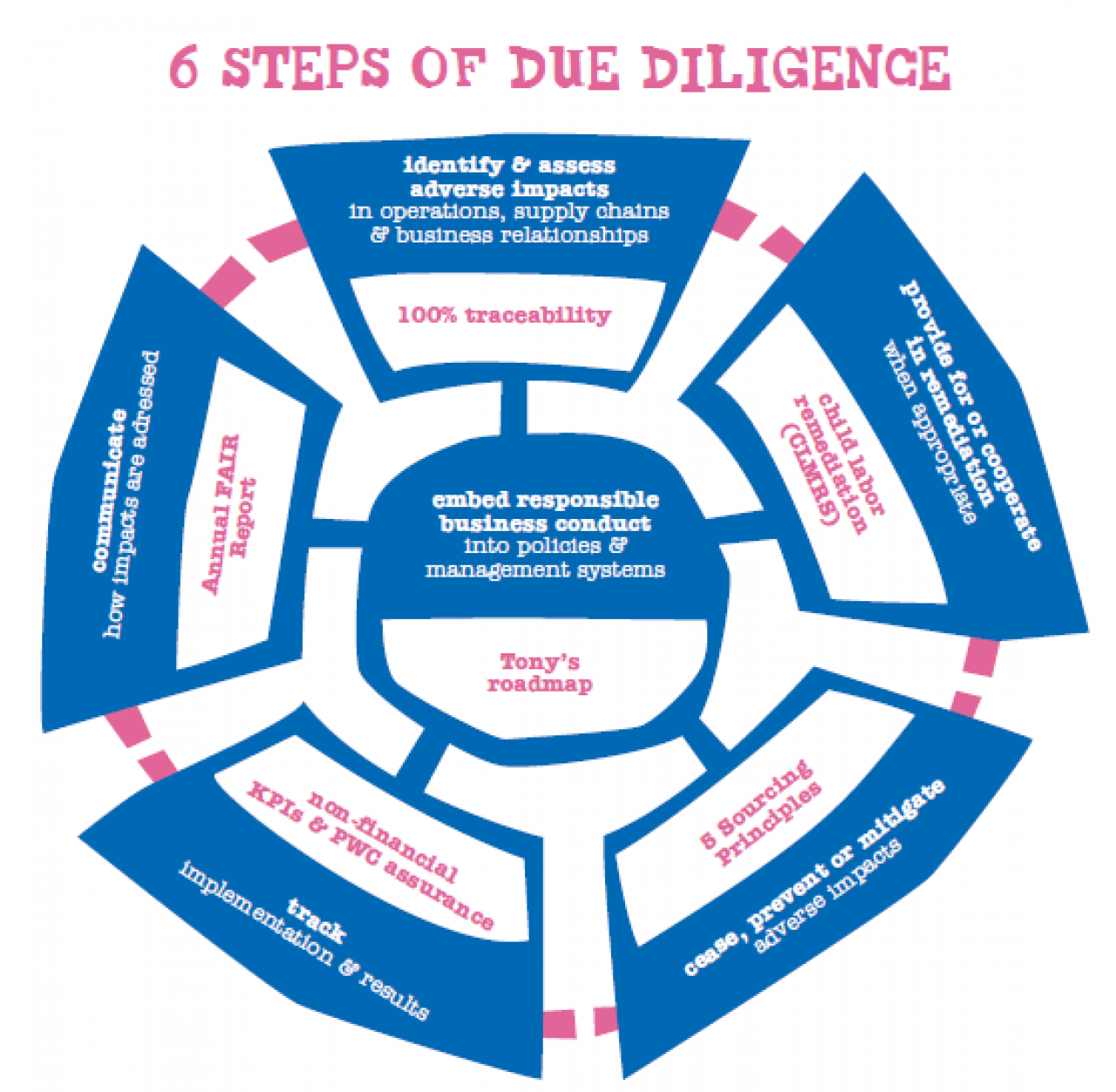Tony's position on human rights & environmental due diligence legislation
We expect the EU to adopt ambitious legislation that will enforce universal human rights and environmental standards by requiring companies to make efforts to identify, cease, prevent, mitigate, monitor (potential) adverse impacts on human rights and the environment. Such requirements should apply to all companies active in the EU market.
It is high time businesses take their consumers and their responsibility seriously. To end human rights violations and environmental abuses in their value chains, Tony’s Chocolonely calls for an ambitious EU regulation to apply to all companies across all sectors – not just Big Choco. Too many companies avoid or neglect their duty of care and European consumers are left in the dark about whether they may contribute to human rights and environmental abuses. EU consumers should never enjoy a product while unknowingly contributing to child labour or modern slavery. For instance, when they take a bite from a chocolate bar.
A bit of background on illegal labour in the chocolate industry: In 2001 the world’s 8 biggest chocolate companies supported the Harkin–Engel protocol, which aimed to eliminate the worst forms of child labour and modern slavery from their supply chains.
Over 20 years later, the protocol has run out and not a single target was met. This kind of stasis is common across sectors that outsource significant portions of their supply chains, exploiting illegal labour in the process. We need to move beyond ineffective self-regulation and create a level playing field. There are too many voluntary sustainability initiatives that do not cover the full supply chain. The introduction of mandatory EU-wide due diligence legislation should help to create a framework for the sustainable and responsible consumption of cocoa (and other products) within the EU, the world’s largest consumer of cocoa and chocolate.
Such legislation has to be rooted in existing international frameworks, including in particular the UN Guiding Principles on Business and Human Rights (UNGP), the OECD Guidelines for Multinational Enterprises and the OECD Due Diligence Guidance for Responsible Business Conduct. The EU should build upon these recognized frameworks and set a global precedent by finally making the respect to those principles enforceable. All governments and companies should work to protect and respect recognized international human rights and environmental standards.
Ambitious EU Due Diligence rules should at least:
1. Define the cocoa sector as a high-risk sector in the EU directive with no exemption based on size. All companies regardless of size, including SMEs should be in scope.
2. Address child labour, modern slavery, the concept of living wages and living income for farmers through fair prices as Human Rights. In particular “the right to an adequate standard of living” which should include companies looking at their purchasing practices and the price they pay for cocoa. Environmental degradation and deforestation should also be part of the obligations.
3. Provide a reporting framework with a set of mandatory elements to enhance sector transparency on efforts and progress.
4. Require that Member States put in place effective administrative sanctions, civil liability regimes and guarantee access to justice in EU courts. This includes victims being guaranteed access to remedies.
Getting the details right
References to Human rights and Environmental abuses should take into account the following priorities which Tony’s Chocolonely regards as essential and universal rights:
On adverse Impact on Human Rights: child labour; modern slavery (forced labour, trafficking); the concept of living wages andliving income for small farmersthrough fair prices under “the right to an adequate standard of living”;respect for local communities’ and indigenous peoples’ community and land tenure rights in all forms; respect for national and international laws and principles.
On adverse Impact on the Environment: the respect for high standards of environmental sustainability; environmental degradation; deforestation; the use of pesticides. We welcome the European Commission's proposal for a regulation on deforestation-free products. This would prevent the import and trading of cocoa and chocolate products if companies cannot guarantee they are deforestation-free. Although we miss measures around land rights, civil liability and the inclusion of other ecosystems, the proposal establishes the need for full traceability - one of Tony's sourcing principles - to prevent environmental and human rights violations in supply chains.
On the proposed cut-off date for deforestation, we notice the European Parliament's proposal wants to set this no later than 2015. We, at least, would like to see an alignment with the CFI cut-off date of 2018 in the upcoming Deforestation Regulation.
Sector-specific guidelines: Some actors, such as Tony’s Chocolonely, have already made significant efforts and have developed due diligence processes and traceability systems to tackle human rights and environmental issues in their specific value chains, based on the specificities ofthe cocoa sector. Therefore, we suggest that actors and stakeholders develop and adopt sector-specific guidance for the cocoa sector to inform actors how to comply with the requirements. Such guidelines should reflect sector-specific issues, best practices and available instruments to effectively prevent human rights abuses and environmental harms. The figure below shows an example of how Tony’s Chocolonely applies the OECD Due Diligence Guidance, including its 5 Sourcing Principles. In parallel, the EU and Member States could provide assistance with verification schemes, including through risk assessments of source areas.


Reporting & transparency
Companies should be required to use a standard DD reporting framework with mandatory general and sectoral KPIs to inform regulators, consumers, shareholders and stakeholders and provide openness about risks of human rights and environmental abuses in their value chain. There should be requirements on companies to subject their due diligence systems to independent third-party audits which results should be published in annual reports. The companies’ annual DD reporting should include information about the design of its due diligence systems, strategies and policies, traceability systems, procedures for the detection, risk analysis and risk mitigation of actual or potential adverse impacts on human rights and the environment. Reporting is not limited to own operations, products and services, and direct business relationships and should include, especially for high-risk sectors, the entire value chain. The DD reporting includes a description of any actions taken, and the result of actions, to prevent, mitigate or remediate such adverse impacts.
Meaningful stakeholder engagement
The legislation should also specify the importance of meaningful stakeholder engagement as an essential part of its due diligence: an ongoing and regular process of safe interaction and open dialogues facilitated by the company and/or its suppliers. As part of this process, companies should identify and prioritize those stakeholders and communities identified as the most vulnerable or the most at risk of harm with respect to a company’s specific activity. Actually or potentially affected stakeholders should be enabled to voice their views and have the company hear, understand and respond to their interests and concerns in order to prevent or remediate cases of (potential) harm for which the company may be accountable, including through collaborative approaches. Companies active in cocoa-producing countries should ensure that all relevant stakeholders are involved, including local community representatives, farmers, industry, and civil society.
The importance of a clear civil liability regime
Companies are liable for any harm arising out of potential or actual adverse impacts on human rights and the environment that a company, or undertakings under its control, have caused or contributed to by acts or omissions. As recognized by UNGP #17 this may relate to third parties: complicity within a value chain may arise when a business contributes to, or is seen as contributing to, adverse human rights impacts caused by other parties. Under this principle, conducting appropriate due diligence helps business enterprises to address risks of legal claims by showing that they took every reasonable step to avoid involvement with an alleged human rights abuse. Non-compliance of the due diligence obligations is evidence of negligent conduct by a company and is relevant to determine whether it caused or contributed to such harm. Non-compliance should result in a reversal of proof in the scope of civil liability cases: the business will have to bear the burden of clarifying the nature of its relationship with the entities involved in the harm and show that it took all reasonable and proportionate measures to prevent the harm from occurring (e.g. based on the size of the company, the nature of operations and the risks of adverse impact in a certain sector or country). Nonetheless, conducting due diligence does not absolve business automatically from liability for causing such abuses.
Access to remedy
A company should be held accountable for harm inflicted through its value chain on citizens – such as farmers or vulnerable persons and communities - and private organizations and provide remedy. Victims of proven harm by companies’ value chains which has been caused by their actions or negligence should have access to effective remedies provided by those companies causing harm. As part of their duty to protect against business-related human rights abuse, states have to provide such access to remedy, which is one of the pillars of the UNGP. Due diligence legislation should require companies to provide for or cooperate with remediation mechanisms when appropriate, based on their connection to the impacts. As described in the UNGP and OECD Guidelines, grievance mechanism should provide routes through which impacted stakeholders, rights-holders and their representatives can bring complaints to the attention of companies and seek to have them addressed through a variety of non-judicial and judicial mechanisms.
Enforcement and judicial mechanisms
Legislation should be respected, enforced and implemented by EU member state government agencies with sufficient powers, resources and expertise. Not complying with the due diligence obligations should carry legal consequences for a company. Guaranteeing access to remedy is part of the commitments of the EU and its Member States within their obligations at international and EU level. But the difficulty in holding parent companies legally accountable for the human rights harms arising from their value chains remains one of the main hurdles faced by claimants in cases of business-related human rights and environmental abuses. If it is found that a company has not complied with the mHREDD obligations, this should not only result in administrative sanctions in the EU Member State. For enforcement and liability to be effective, it will be key that EU law provides an adequate legal framework that guarantees clear and swift access to justice in EU courts to victims in civil liability cases. (Which may require a review of the Brussels I Regulation and the Rome II Regulationto respond to the specific circumstances in tort cases related to the subsidiaries and the larger value chain of a business.)
On sanctions
No sanction should lead to divestments that affect farmers or workers, prevent remedies or cause stopping activities. Non-compliant companies should be sanctioned and held liable under the new EU law. Penalties specified in the legislation should be proportionate and dissuasive, in order to help ensure that the due diligence obligations drive real change in the sector. The legislation should also require companies to provide for or cooperate with remediation mechanisms. It should also provide for independent grievance and complaints mechanisms.
On import bans
Blanket import bans are not the solution because they prevent engaged companies from improving the situation and forces them to divert activities away from whole countries and sectors. For instance, in order to improve the situation, Tony’s Chocolonely intentionally focuses on producing countries, such as Côte d’Ivoire and Ghana, where abuses still take place. However, well-designed measures allowing for import controls and possible import bans can be effective to prevent irreparable harm; ineffective preventive and remediation efforts; and to guarantee the compliance of mHREDD rules. This is especially relevant when high risk countries or sectors are involved. Risk-based border controls should also allow third parties to point out elevated risks of non-compliance based on ‘substantiated concern’.
Producing countries
Due diligence legislation will have greater impact if it is accompanied by the creation of the enabling environment required to make progress on sustainable cocoa farming within cocoa-producing countries. As also advocated by a large part of the cocoa sector and other stakeholders, this underlines the need for partnership agreements between the EU and cocoa-producing countries.
Actions beyond CSR and green washing
Legislation should make companies ‘pull’ responsibility towards them and not only rely on third parties, such as certification schemes or auditors, to take over due diligence tasks on their behalf. As a Fairtrade certified company, we reiterate that while certification schemes are useful instruments, they are not a substitute for due diligence legislation. The responsibility and the duty to care remains at the level of the companies and should not become a tick-box exercise. It should stimulate continuous efforts to address the risks of human rights abuses and environmental harm.
The benefits of caring
Our experience, clearly shows that an active mHREDD approach creates benefits for societies, communities, consumers and companies. This active protection of human right and safeguarding from environmental risks is nothing exceptional; it is part of conducting a normal business responsibly, especially in a high-risk sector such as the cocoa sector. Our journey and rapid growth show that this is what consumers are asking for. This rights-based approach to business benefited small companies such as Tony’s Chocolonely to outgrow their SME status and therefore increase their positive impact in the social, as well as environmental realm.
Companies that are opposed to additional costs of due diligence obligations, have probably been avoiding such duties. While turning a blind eye and keeping their customers in the dark, they have been profiting from unduly cost savings for too long. Such neglectful behaviour by companies and their suppliers has inflicted harm on people and their environment and must be identified, reported, prevented and remediated.
























